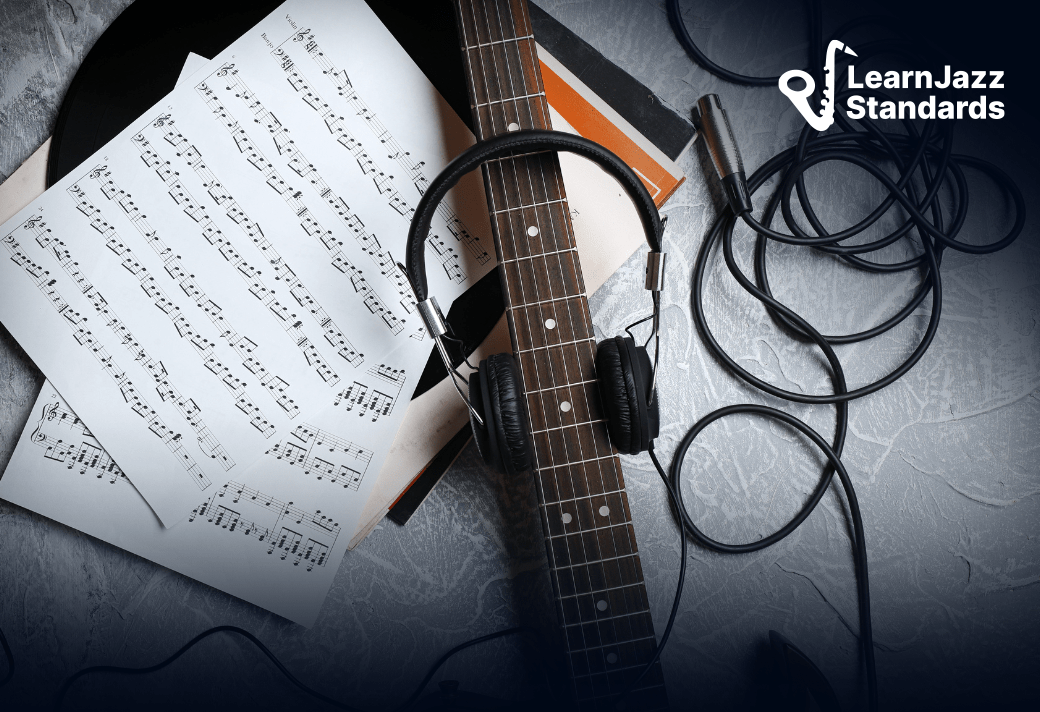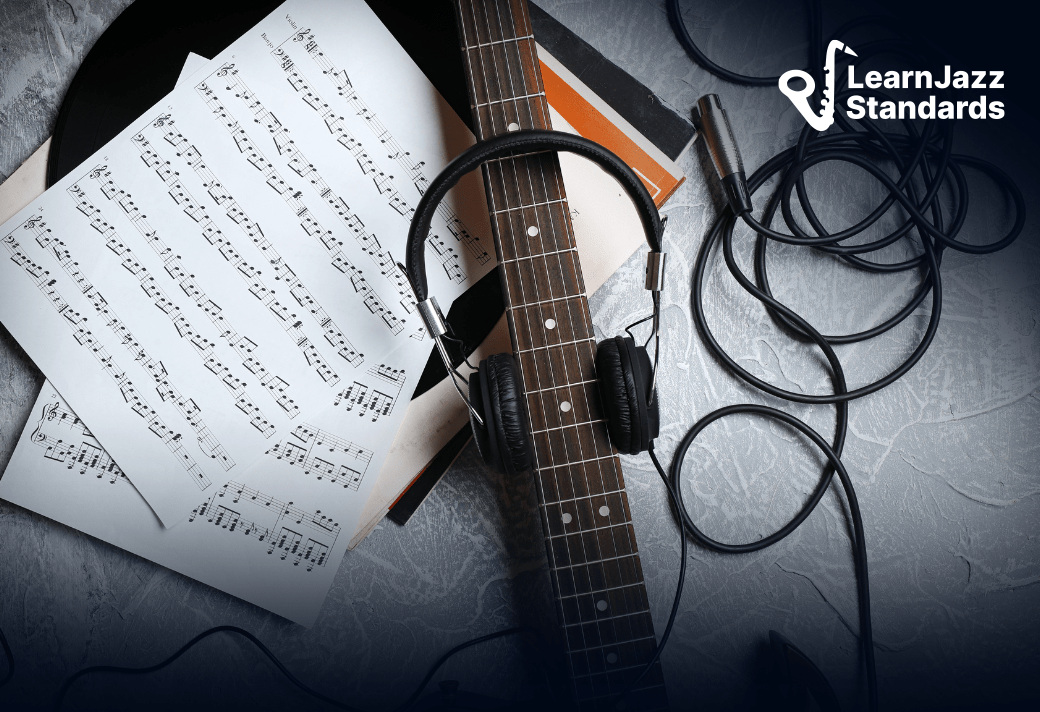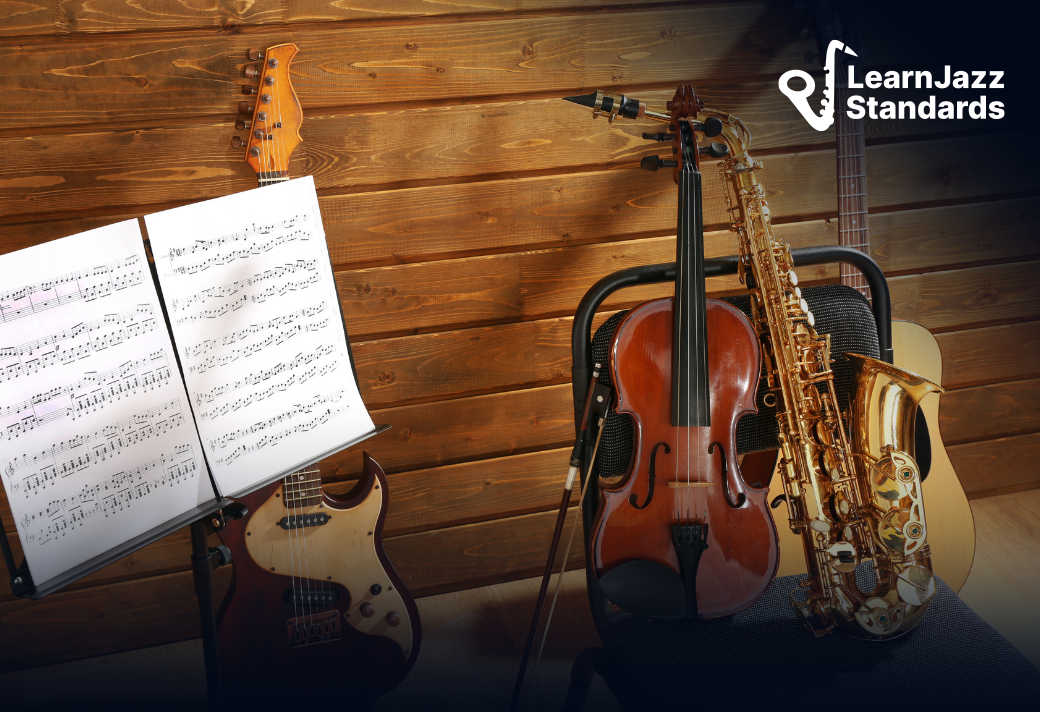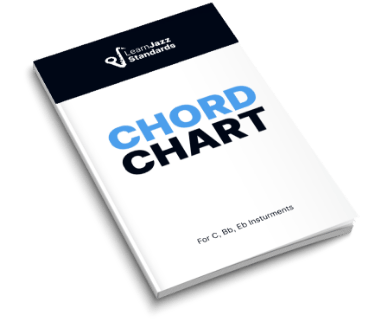Ready for a comprehensive jazz scales guitar workshop? I’ve compiled 20 scales essential for learning jazz and jazz vocabulary. We’ll dive into these twenty scales and why they are critical for mastering jazz improvisation on the guitar.
We’ll cover—
- Understanding Chord-Scale Relationships
- Modes of the Major Scale (and why you need to start with them)
- Melodic Minor and its Modes
- Diminished Scales on Guitar
- Bebop Scales on Guitar
- Other Important Scales
Whether you play straight-ahead jazz, jazz blues, rock, fusion (or any genre), mastering scales on the guitar neck is crucial for your development as a guitarist (and as a musician, specifically). Learning scale patterns on the neck can be helpful for learning scales, but…
As a musician, you must understand how chords and scales work. To take your guitar playing to the next level, you must go beyond the bounds of your instrument.
If you want a proven method for jazz mastery, you should check out the Learn Jazz Standards Inner Circle. We have guitar-specific resources and abundant music theory, jazz theory, and improvisation courses and workshops to help you grow into the best musician you can be.
So, are you ready to learn some jazz scales? Let’s dive in.
Table of Contents
Chord-Scale Relationships in Music Theory
Scales and chords are different representations of the same thing—in this case, a pitch environment. How we think about scales and chords helps us better understand their relationship.
It’s one thing to know that jazz guitarists use scales to play over chords, but it’s another thing entirely to understand why certain scales work over certain chords while others don’t.
It’s like the difference between knowing that gasoline fuels your car and understanding how combustion engines actually work.
Let’s get more specific about how chords and scales actually function in music theory in an effort to understand why certain jazz scales work over certain chords.
What Are Chords and Scales In Music Theory?
Literally, a chord is a specific group of notes played simultaneously, and a scale is comprised of a sequence of notes played linearly or in a scale pattern, one note at a time (let’s forget about chord scales for a second).
Chords usually isolate specific notes from a scale. Diatonic chords use the major scale as the parent tonality or pitch environment. You can take the sequence of notes in a scale (we’ll use the major scale) and “stack” notes to construct diatonic chords.

In the image above, we started with a C major scale (red) and then “stacked” a third on top of each note in the scale and stacked additional thirds above those notes. This process gives us all the diatonic triads in major keys.
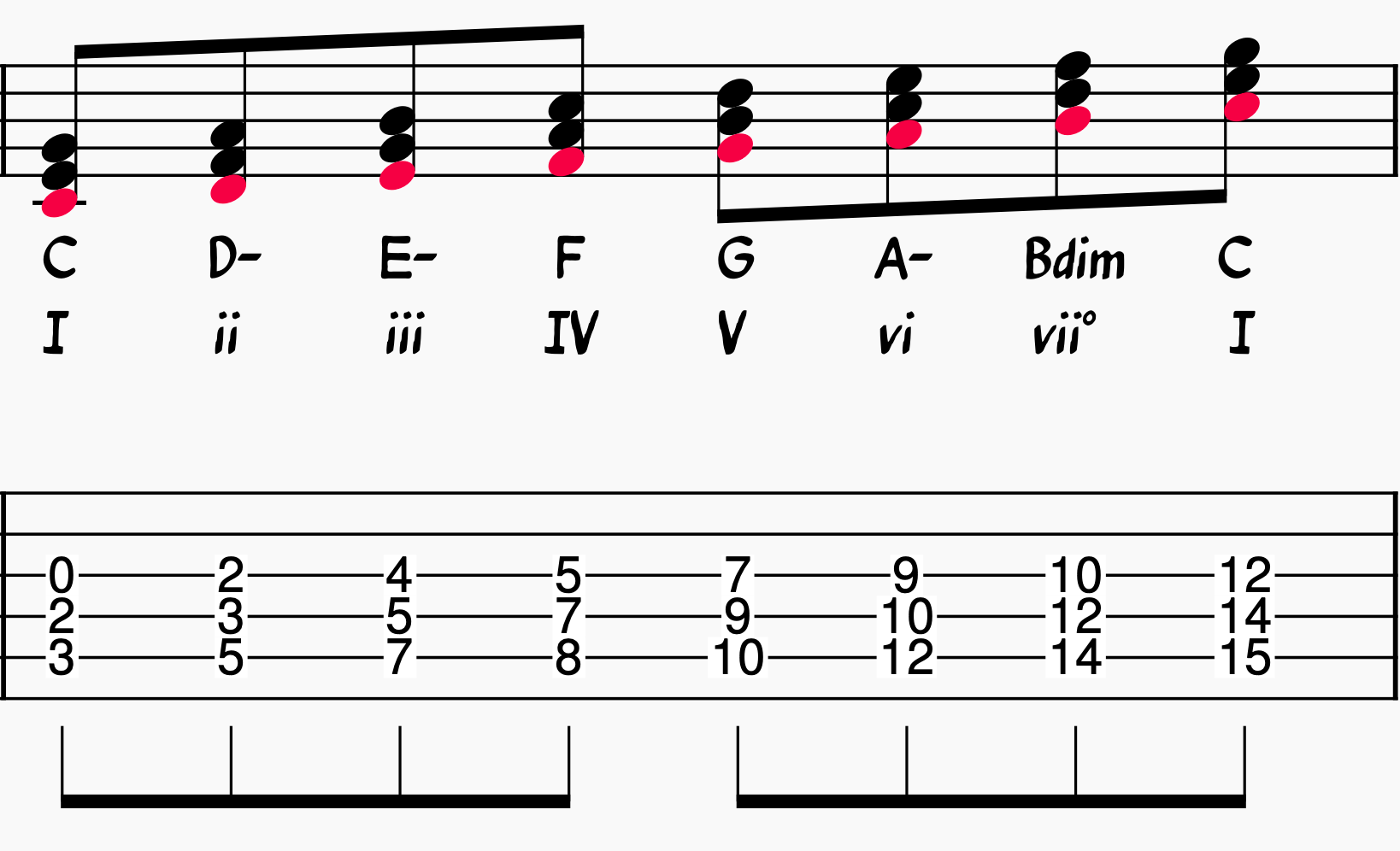
Many chord progressions in jazz music are diatonic, which means the harmonic movement is based on the relationships in the major scale. Although a song’s key may change frequently, the motion of the chords is still based on the relationships found within the major scale, no matter the key.
That’s why it’s so important to learn the modes of the major scale when learning major scales on the guitar.
Diatonic Chord Progressions and Major Scale Modes
When thinking about jazz guitar improvisation, you’ll first need to know how to use major scale modes to play over diatonic chord progressions. We go much deeper into major scale modes in our article on musical modes; however, here is a brief overview:
We’ve already established that you can build seven diatonic chords from the major scale notes. Along with these chords, we can derive seven scales from the notes of the major scale. These seven scales are the musical modes. Here’s how we get there.
The C major scale sequence is just that—a sequence that repeats itself up and down in pitch:
- C-D-E-F-G-A-B-C-D-E-F-G-A-B-C-D-E-F-G-A-B-C
Because it’s a sequence, you can start on any note within it and find your way back to the same note an octave higher or lower. This is the essence of modes. Any note in the scale sequence can be counted as the root note. We change what counts as 1, 2, 3, 4, 5, 6, and 7, but the sequence remains intact.
Here are the seven modes of the major scale (we’ll get into each one in greater detail later):
- Major Scale (Ionian Mode and “Parent Scale” for all the following modes; works over the I chord)
- C-D-E-F-G-A-B-C-D-E-F-G-A-B-C-D-E-F-G-A-B-C
- Dorian Scale (mode built from the second scale degree; works over the ii chord)
- D-E-F-G-A-B-C-D-E-F-G-A-B-C-D-E-F-G-A-B-C-D
- Phrygian Scale (mode built from the third scale degree; works over the iii chord)
- E-F-G-A-B-C-D-E-F-G-A-B-C-D-E-F-G-A-B-C-D-E
- Lydian Scale (mode built from the fourth scale degree; works over a IV chord)
- F-G-A-B-C-D-E-F-G-A-B-C-D-E-F-G-A-B-C-D-E-F
- Mixolydian Scale (mode bult from the fifth scale degree; works over a V chord)
- G-A-B-C-D-E-F-G-A-B-C-D-E-F-G-A-B-C-D-E-F-G
- Aeolian Scale (mode built from the sixth scale degree; works over a vi chord)
- A-B-C-D-E-F-G-A-B-C-D-E-F-G-A-B-C-D-E-F-G-A
- Locrian Scale (mode built from the 7th scale degree; works over a viiø chord)
- B-C-D-E-F-G-A-B-C-D-E-F-G-A-B-C-D-E-F-G-A-B
If you are improvising over a diatonic chord progression—let’s say an [I-vi-ii-V] in C major—you’d be able to relate each chord in the progression to its corresponding mode:
- I chord is C = C Ionian scale
- vi chord is A- = A Aeolian scale
- ii chord is D- = D Dorian scale
- V chord is G = G Mixolydian scale
These seven jazz scales are the first jazz scales you need to learn! So let’s do it:
Jazz Scales Guitar Workshop: the Seven Modes of the Major Scale
1. Ionian or Major Scale
Our first jazz guitar scale is the major scale. As we discussed above, it’s one of the most important scales to understand because all the diatonic chords and modes can be found within its intervals.
- Notes: C-D-E-F-G-A-B-C
- Step Formula: W-W-H-W-W-W-H
- Scale Degrees: Rt., M2, M3, P4, P5, M6, M7
The major scale works over diatonic I chords and major chords generally. However, other major scale modes will fit better if the major chord acts as the IV or the V in a chord progression.
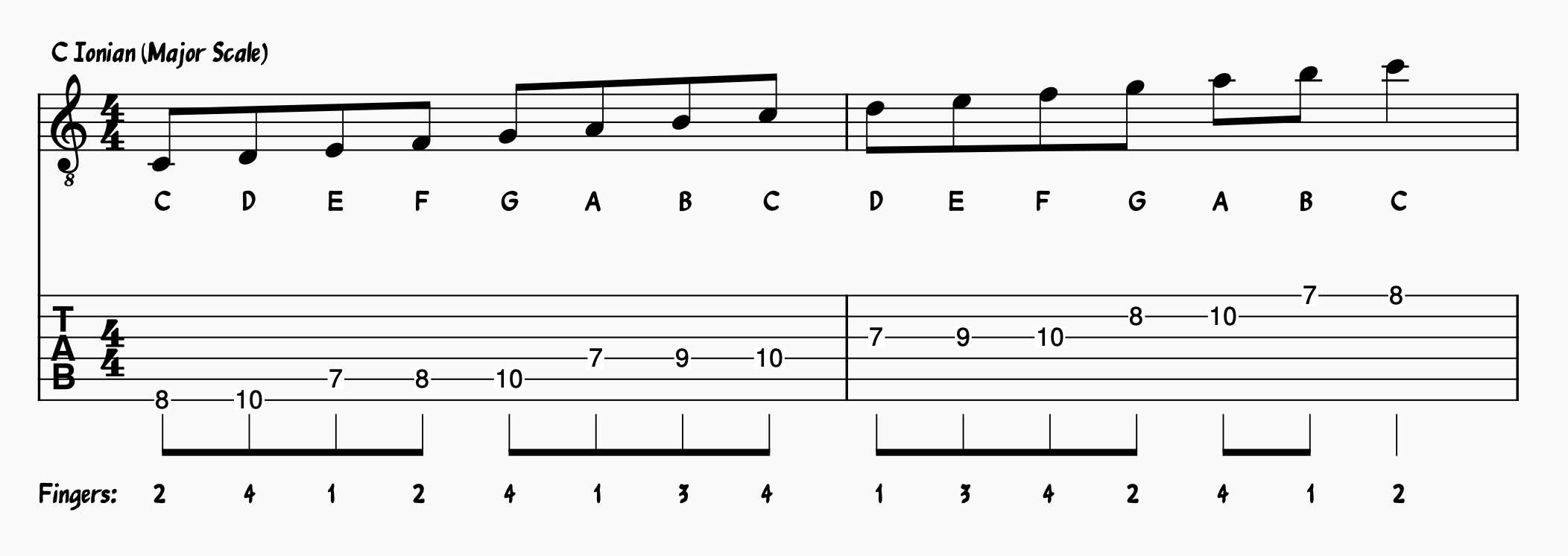
2. Dorian Scale (Dorian minor)
The Dorian scale is the second of our jazz guitar scales. It is a minor scale with a raised 6th scale degree (major sixth interval from the root note). This scale is particularly useful as a jazz scale because it is the mode that corresponds to the ii chord.
The ii chord is often used in jazz chord progressions like the 2-5-1.
- Notes: D-E-F-G-A-B-C-D
- Step Formula: W-H-W-W-W-H-W
- Scale degrees: Rt., M2, m3, P4, P5, M6, m7
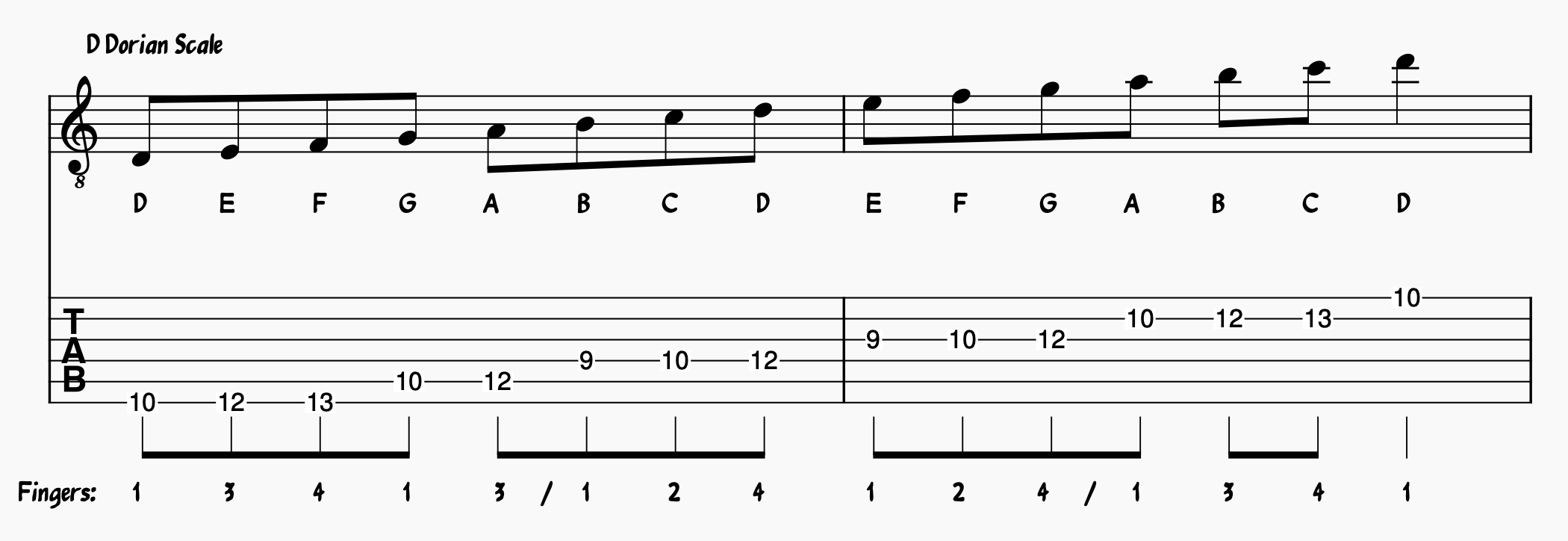
The ii chord works over any minor chord functioning as the ii chord or over static modal minor harmony.
3. Phrygian Scale (Phrygian Minor)
The Phrygian scale is the third jazz guitar scale we’re studying. It’s the third mode and is based on its third scale degree.
- Notes: E-F-G-A-B-C-D-E
- Step Formula: H-W-W-W-H-W-W
- Scale Degrees: Rt., m2, m3, P4, P5, m6, m7
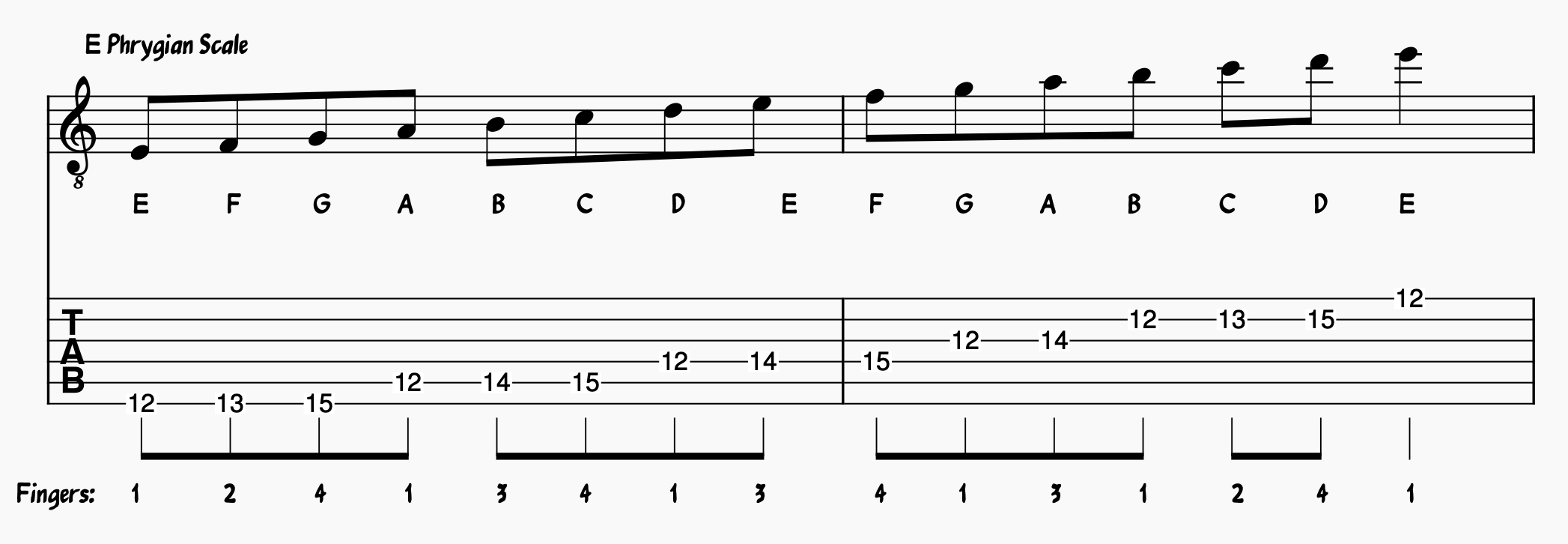
This jazz scale can be played over the iii chord in jazz chord progressions like the [iii-vi-iiV] or over minor modal harmony based around the Phrygian mode.
4. Lydian Major (Lydian Scale)
Coming in at number four on our jazz guitar scales list, the Lydian mode is a major scale with a raised fourth scale degree. This raised fourth scale degree creates a tritone with the root note. Lydian major sounds brighter than its parent scale.
- Notes: F-G-A-B-C-D-E-F
- Step Formula: W-W-W-H-W-W-H
- Scale Degrees: Rt., M2, M3, TT, P5, M6, M7

The Lydian scale will work over diatonic VI chords or maj7#11 chords. For more on the Lydian scale, check out our article explaining the Lydian mode.
5. Mixolydian Scale (Dominant Scale)
The Mixolydian mode is a major scale with a minor 7th scale degree. It is also called the dominant scale because it is the mode based on the 5th scale degree, and its corresponding chord is a dominant chord.
- Notes: G-A-B-C-D-E-F-G
- Step Formula: W-W-H-W-W-H-W
- Scale Degrees: Rt., M2, M3, P4, P5, M6, m7
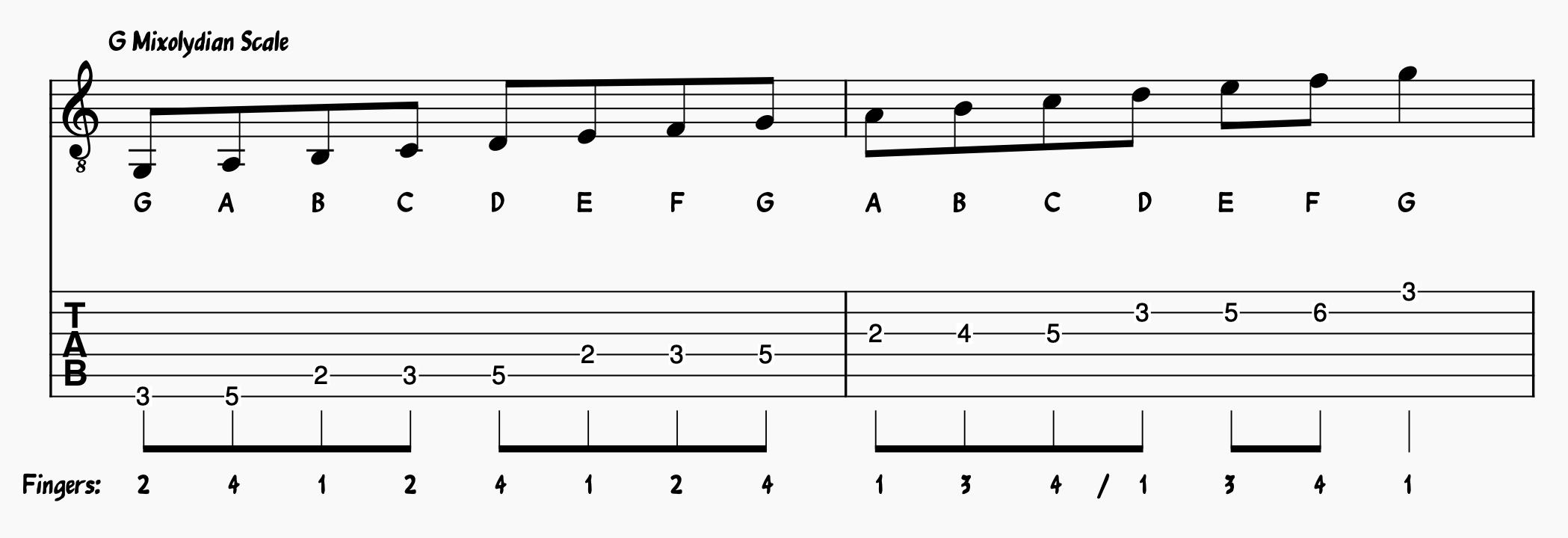
Jazz guitarists not only use the Mixolydian scale over V chords in diatonic chord progressions but also use it over the blues. The dominant sound is a crucial part of blues music. To learn more about the Mixolydian mode, check out our article on the Mixolydian scale.
6. Aeolian or Natural Minor Scale
The natural minor scale is the sixth mode of the major scale or the parent scale in minor keys.
- Notes: A-B-C-D-E-F-G-E
- Step Formula: W-H-W-W-H-W-W
- Scale Degrees: Rt., M2, m3, P4, P5, m6, m7
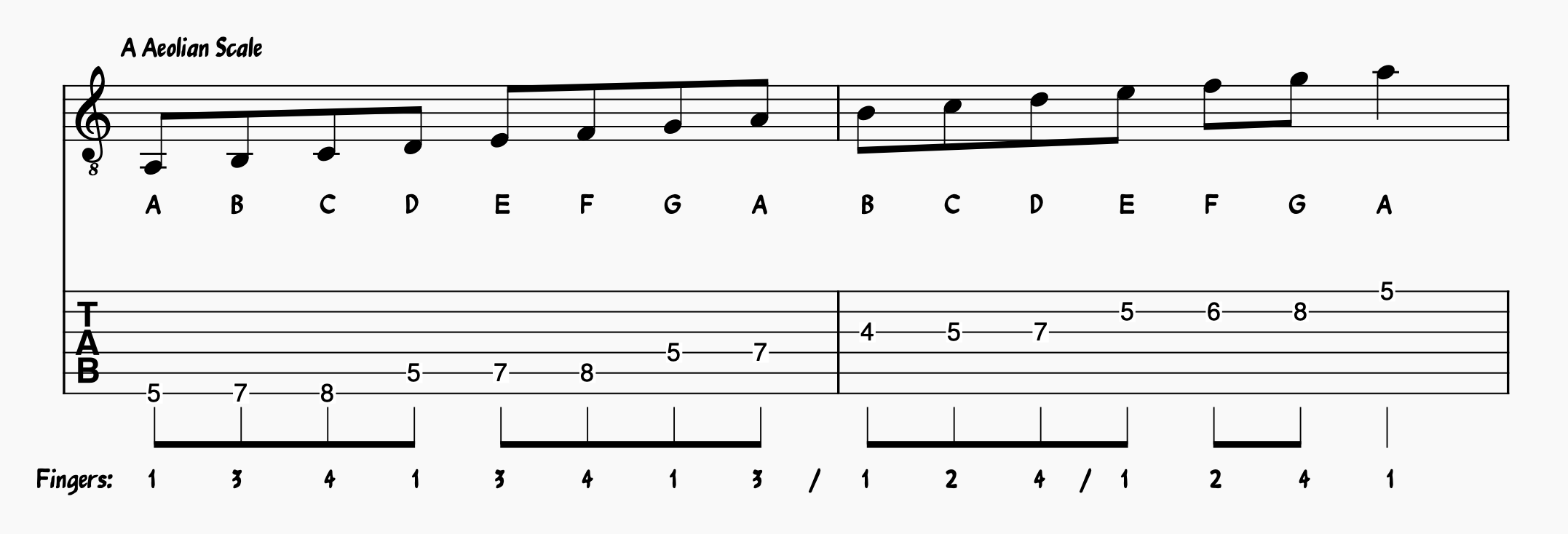
You can think of the Aeolian scale as a mode of the major scale or its own parent scale, where the Ionian scale becomes one of its modes.
If you’ve heard of relative major and minor, this is the scale equivalent of that relationship.
Major keys:
- I chord = C
- ii chord = D-
- iii chord = E-
- IV chord = F
- V chord = G
- vi chord = A-
- viiø chord = Bdim
Minor Keys:
- i chord = A-
- iiø chord = Bdim
- III chord = C
- iv chord = D-
- v chord = E-
- VI chord = F
- VII chord = G
For more on the natural minor scale, check out our deep dive into natural minor.
7. Locrian or Half Diminished Scale
Locrian is the last of our guitar scales based on the major scale. It is the seventh mode and built off the seventh scale degree.
- Notes: B-C-D-E-F-G-A-B
- Step Formula: H-W-W-H-W-W-W
- Scale Degrees: Rt., m2, m3, P4, TT, m6, m7
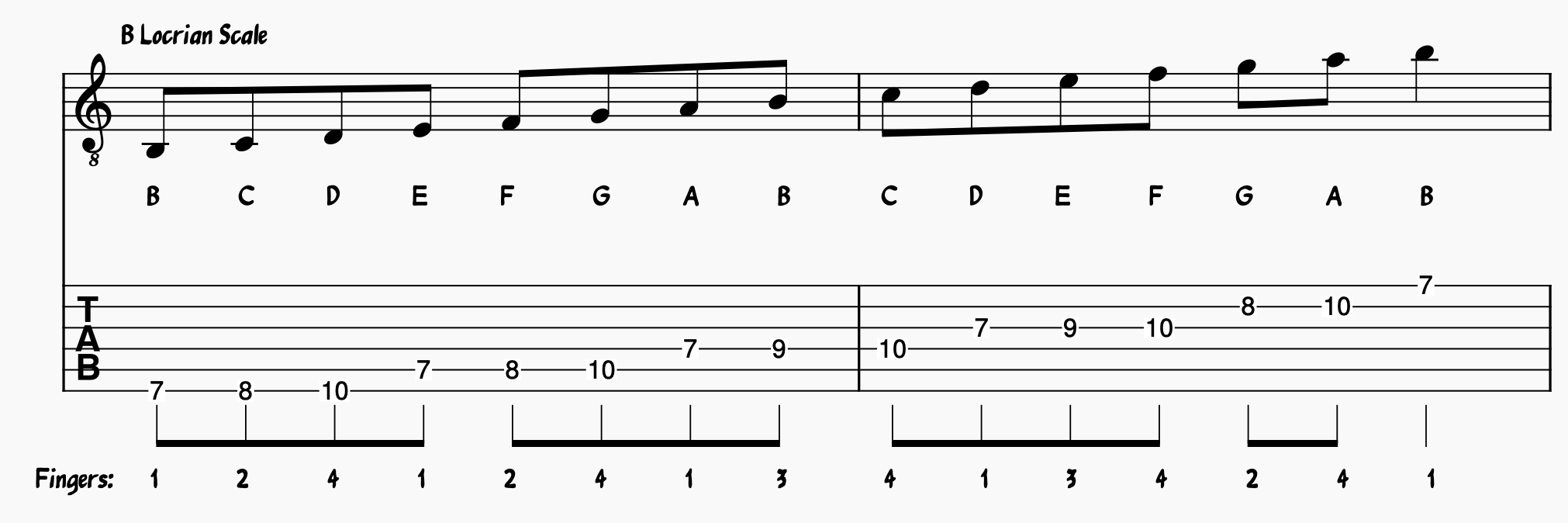
Locrian scales work well over the ii chords in minor iiø-V-i progressions. In minor keys, the iiø chord is half-diminished.
When the Modes of the Major Scale Aren’t Enough
Learning modes is an essential first step when learning jazz guitar scales. However, jazz music contains many sounds that aren’t diatonic, meaning they can’t be derived from the major scale. To truly master jazz scales, we need to learn jazz scales outside of diatonic harmony.
That’s why we will explore the melodic minor scale and some of its most important modes before digging into other essential jazz guitar scales.
BEFORE YOU CONTINUE...
If you struggle to play amazing jazz solos and want to learn the secret strategies the pros are using to improvise, our free guide will get you on the right track.

The Melodic Minor Scale and its Modes
The melodic minor scale is often called the jazz minor scale because its sound is extremely important to jazz music. Jazz musicians who have mastered the major scale should move on to the melodic minor scale next.
Like the major modes, there are seven modes of melodic minor:
- Melodic Minor
- Dorian Flat 2
- Lydian Augmented
- Lydian Dominant
- Mixolydian Flat 6
- Locrian Flat 2
- Super Locrian or Altered Scale
Though these modes have unique uses, this article will only focus on the melodic minor scale, Lydian dominant, and the altered scale. Check out this article for a full breakdown of melodic minor modes.
8. Melodic Minor Scale
There are two ways jazz guitarists can think of this scale:
- A minor scale with a raised sixth and seventh scale degree.
- A “major scale” with a minor third-scale degree.
The characteristics of melodic minor are both major and minor. The beginning of the scale is minor in tonality. However, the second half is major sounding because of the raised sixth and seventh scale degrees.
- Notes: A-B-C-D-E-F#-G#-A
- Step Formula: W-H-W-W-W-W-H
- Scale Degrees: Rt, M2, m3, P4, P5, M6, M7
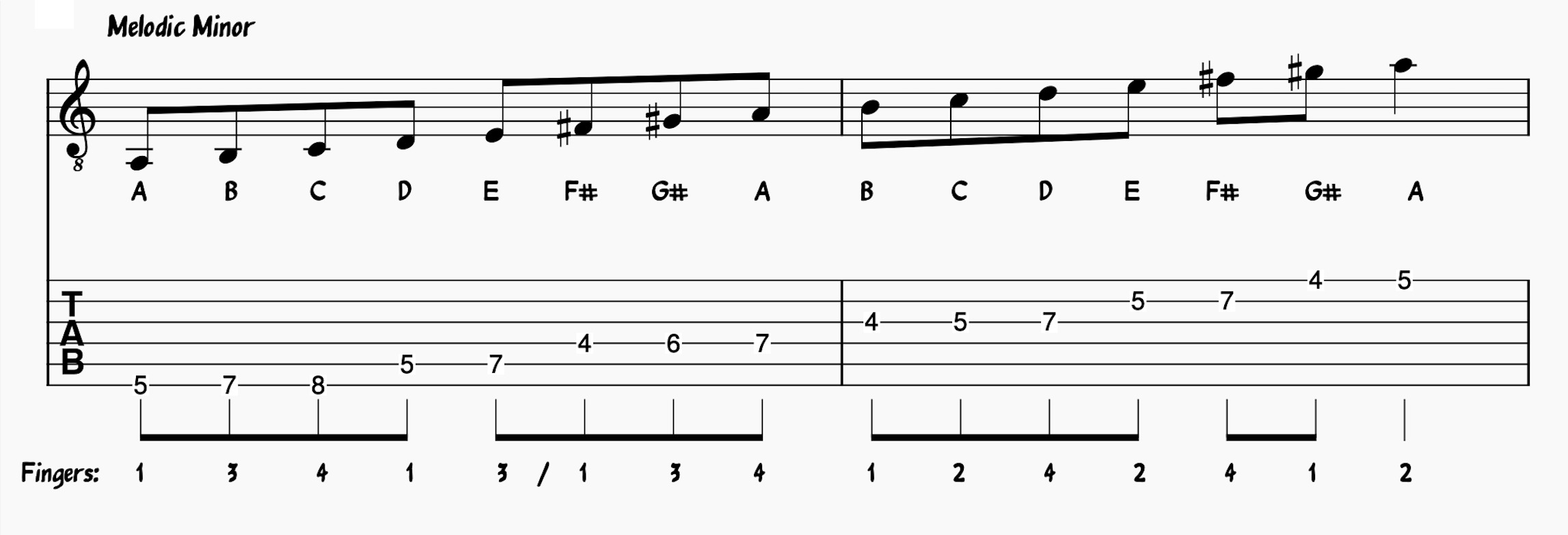
Melodic minor itself is useful over minor chords with a (maj7). It also works well over the ii chord in altered [ii-V-I] chord progressions.
For example, an altered ii-V-I in G looks like this:

Over the V chord, the major 6th interval of melodic minor functions as the 3rd (F#), and the major 7th interval functions as the #11 (G#).
9. Lydian Dominant (4th mode of Melodic Minor)
The fourth mode of melodic minor is also an extremely important scale in jazz. It is a Mixolydian scale with a raised 4th scale degree. Lydian dominant is perfectly suited for dominant chords with a #11.
- Notes: C-D-E-F#-G-A-Bb-C
- Step Formula: W-W-W-H-W-H-W
- Scale Degrees: Rt., M2, M3, TT, P5, M6, m7
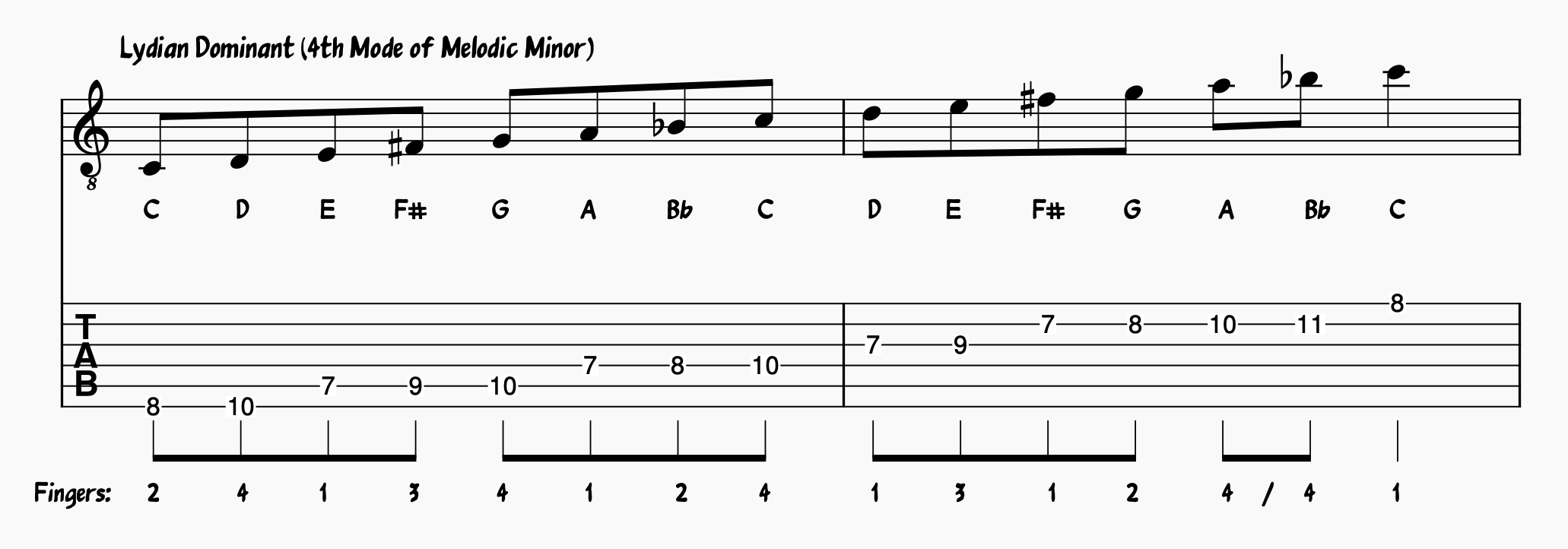
Dominant #11 chords are often used over Dominant II chords in jazz chord progressions. Jazz tunes like Donna Lee, There Will Never Be Another You, If I Were a Bell, and But Not For Me (among many others) feature the dominant II chord.
For example, lydian dominant works really well over the F7 chord in There Will Never Be Another You:
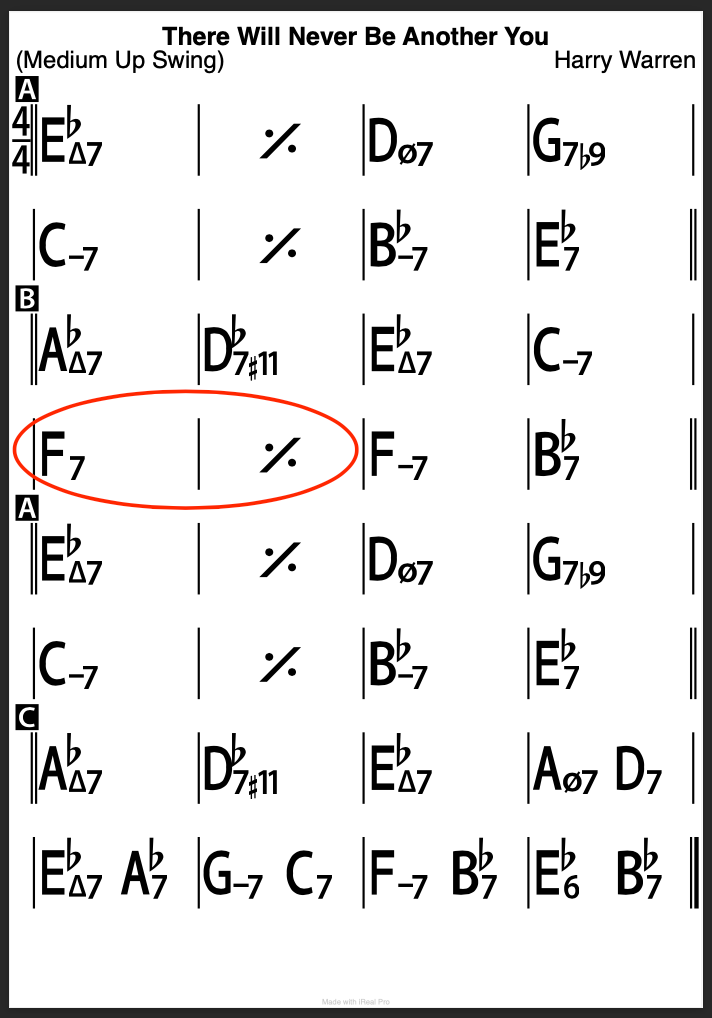
10. Altered Scale (7th mode of Melodic Minor)
The altered scale is another vitally important scale jazz guitarists need to know. It starts like a diminished scale, alternating whole and half steps. However, it ends more like the whole tone scale with a series of whole steps.
- Notes: B-C-D-Eb-F-G-A-B
- Step Formula: H-W-H-W-W-W-W
- Scale Degrees: Rt., m2, m3, M3, TT, +5, m7
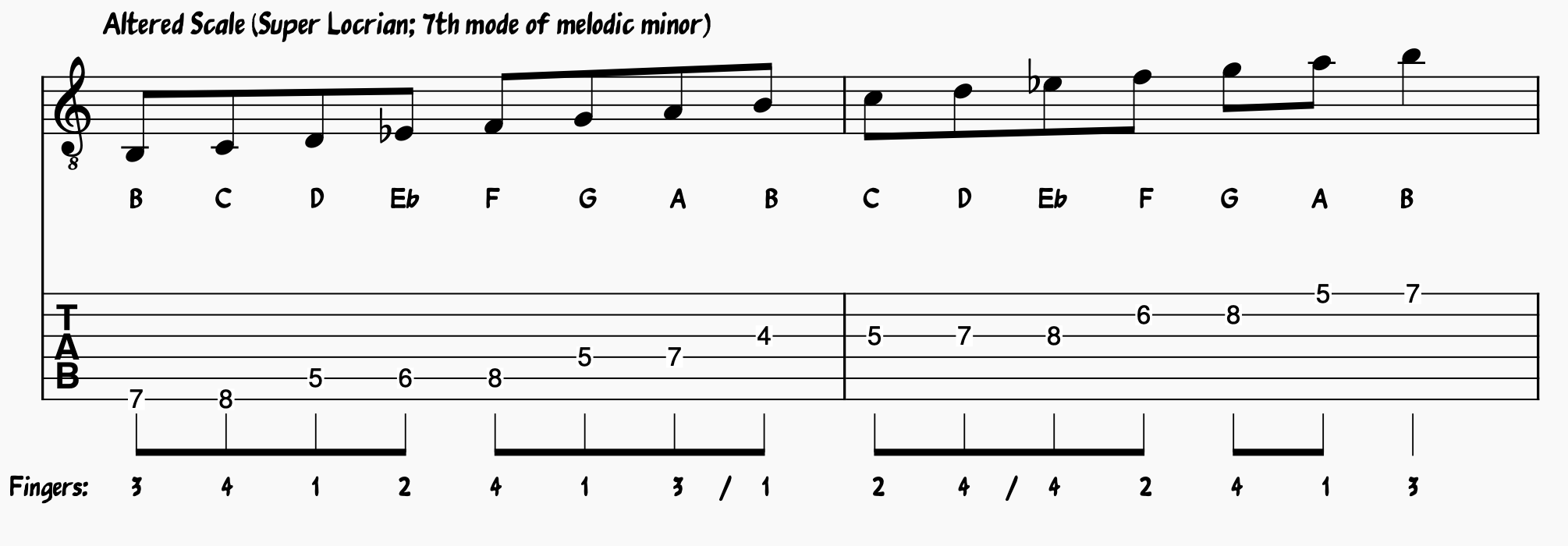
The altered scale gets its name because it is perfect for altered dominant chords. The diminished series at the beginning of the scale hits altered chord tones like the b9 and the #9, while the whole steps at the end of the scale provide a b5, #5, and b7.
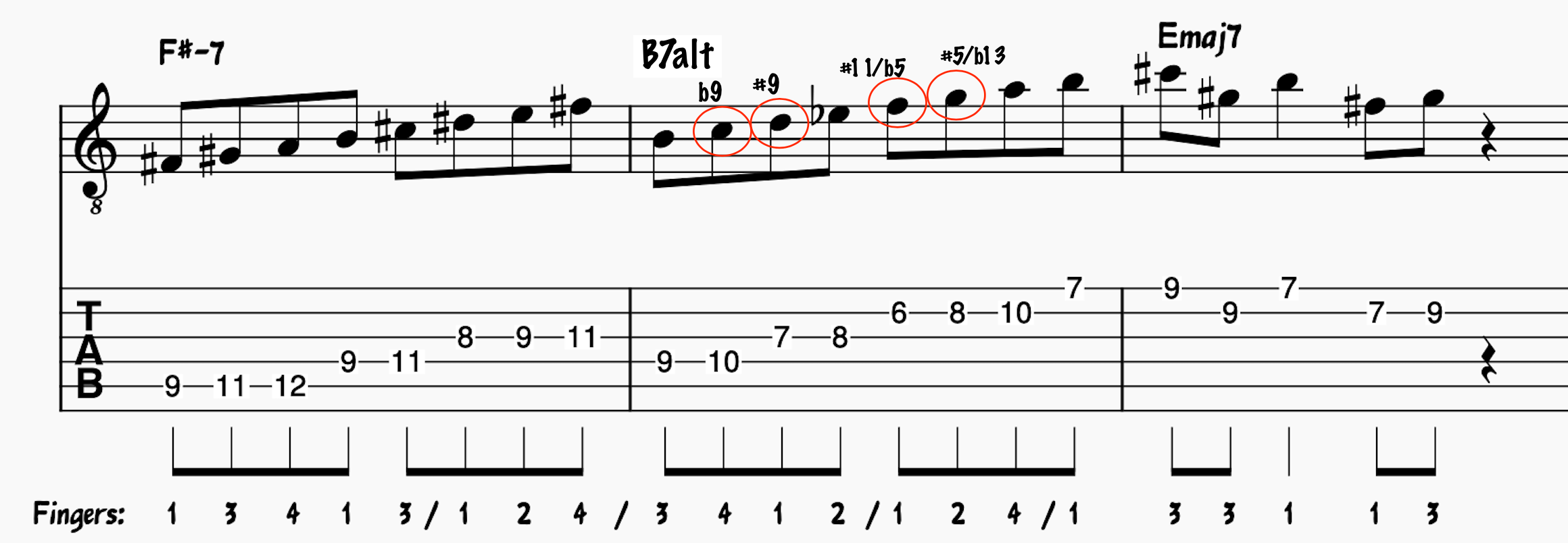
The Diminished Scales on Guitar
Two other jazz scales guitarists need to know are the two diminished scales. Depending on which scale you choose, you can play over altered dominant or fully-diminished chords.
The diminished scale consists of alternating whole steps and half steps. As a result, it is symmetrical and has only two modes—one that starts on a half step and one that starts on a whole step.
11. Half-Whole Diminished or Dominant Diminished Scale
The half-whole or dominant diminished scale works well over altered dominant chords with a natural 5. Every note is either a chord tone, extension, or altered extension:
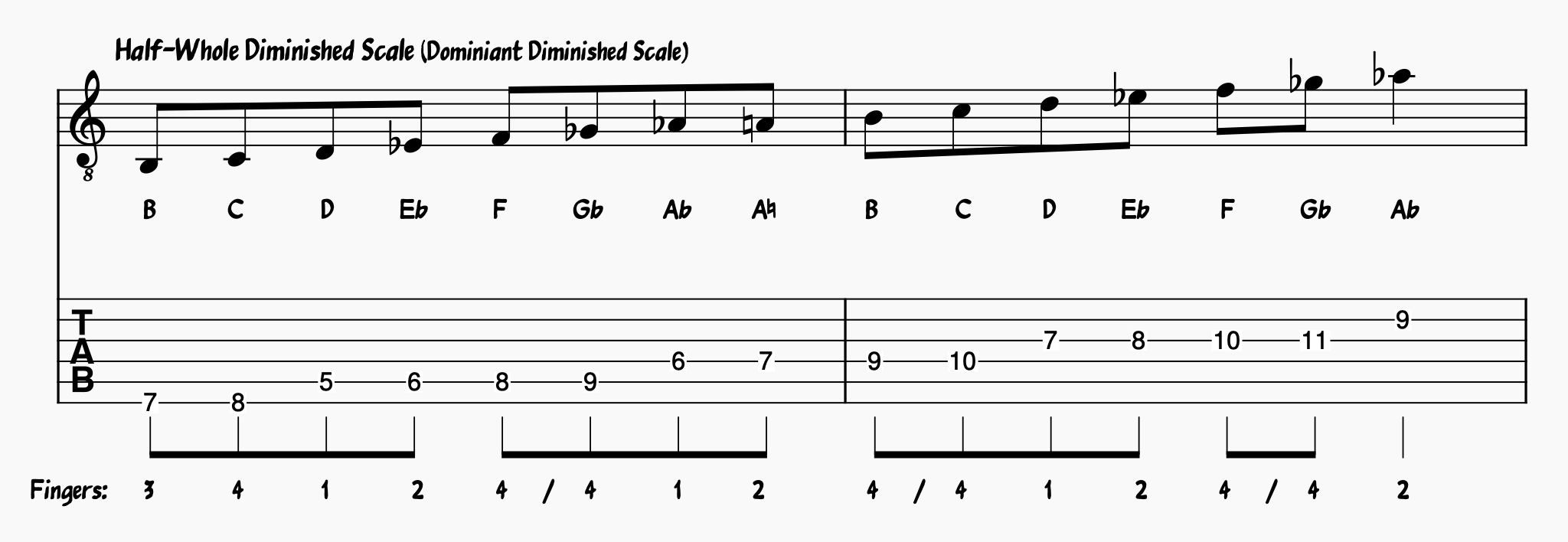
12. Whole-Half Diminished Scale
The whole-half diminished scale is best used over fully-diminished chords:
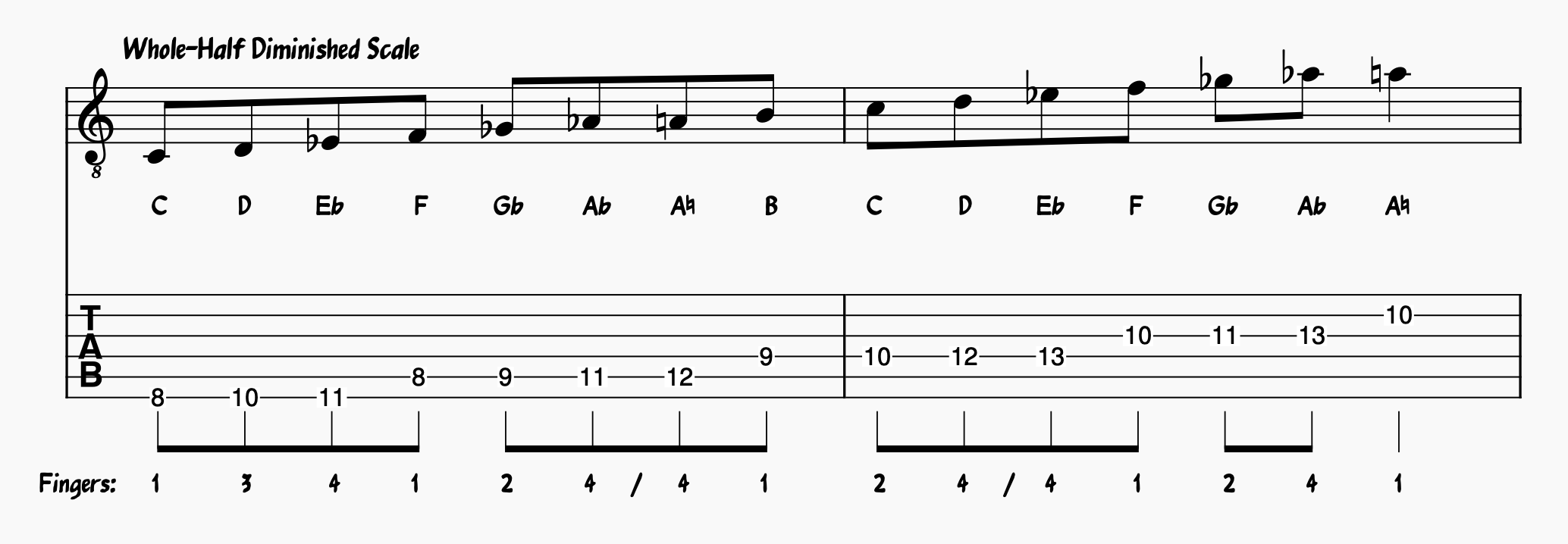
Bebop Scales (Essential For Jazz Vocabulary)
So, we’ve covered scales that work well over specific chords and tonal centers, but what about Bebop scales? Bebop language is notorious for using “technically wrong” notes very specifically to add propulsion and momentum to jazz improvisation.
Bebop lines use chromaticism to keep certain chord tones on the downbeats. Here’s how:
The typical rhythmic unit of choice in bebop vocabulary is the eighth note. If you were to play a line of 8th notes over a C7 chord, you’d probably opt for a Mixolydian scale:

However, after one measure, your chord tones (C, E, G, Bb) are on the upbeats, and the whole thing sounds a bit weird.
By adding a chromatic passing tone into the mix, we can get back on track:

Because bebop scales have chromatic passing tones, we can perpetually keep chord tones on downbeats.
Technically, any scale can incorporate chromatic passing tones. However, over the years, jazz musicians have standardized where these chromatic passing tones usually fit into the picture. Here are four commonly used bebop scales:
13. Major Bebop Scale
The major bebop scale puts a chromatic passing tone between the 5th and 6th scale degrees:
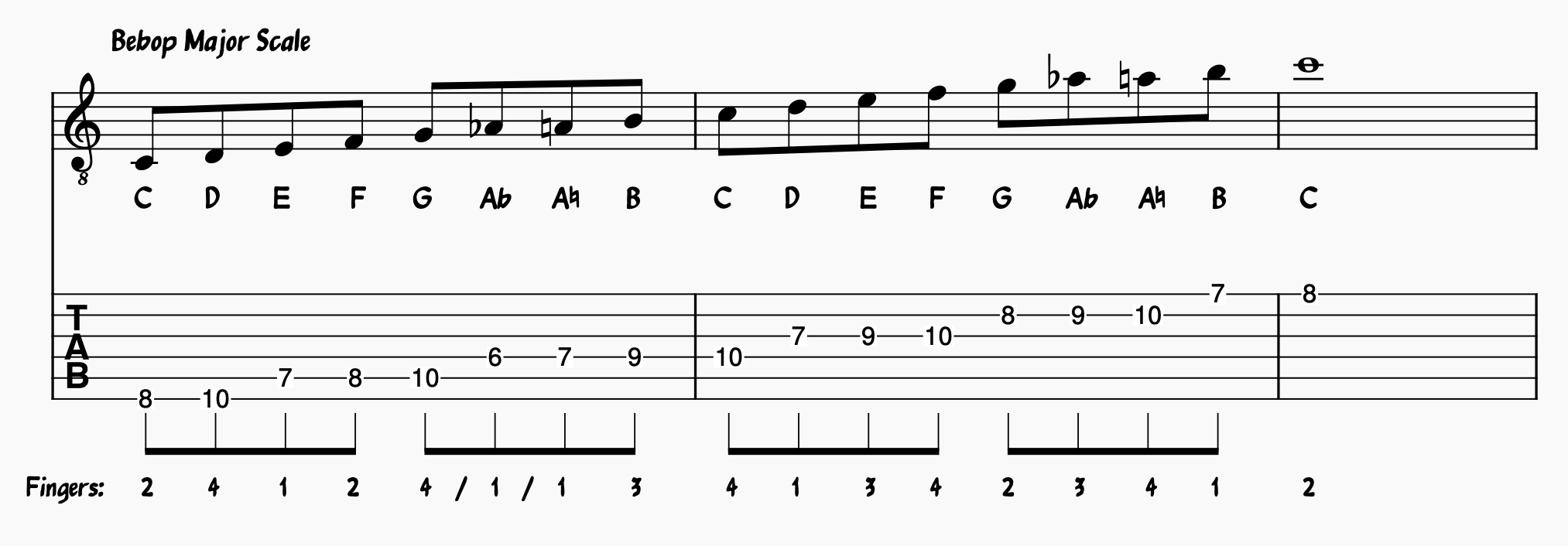
14. Minor Bebop Scale (Dorian Bebop)
The Dorian bebop scale has a chromatic passing tone between the minor third and the fourth scale degree. Yes, it’s a major third, but you won’t be staying there for long!
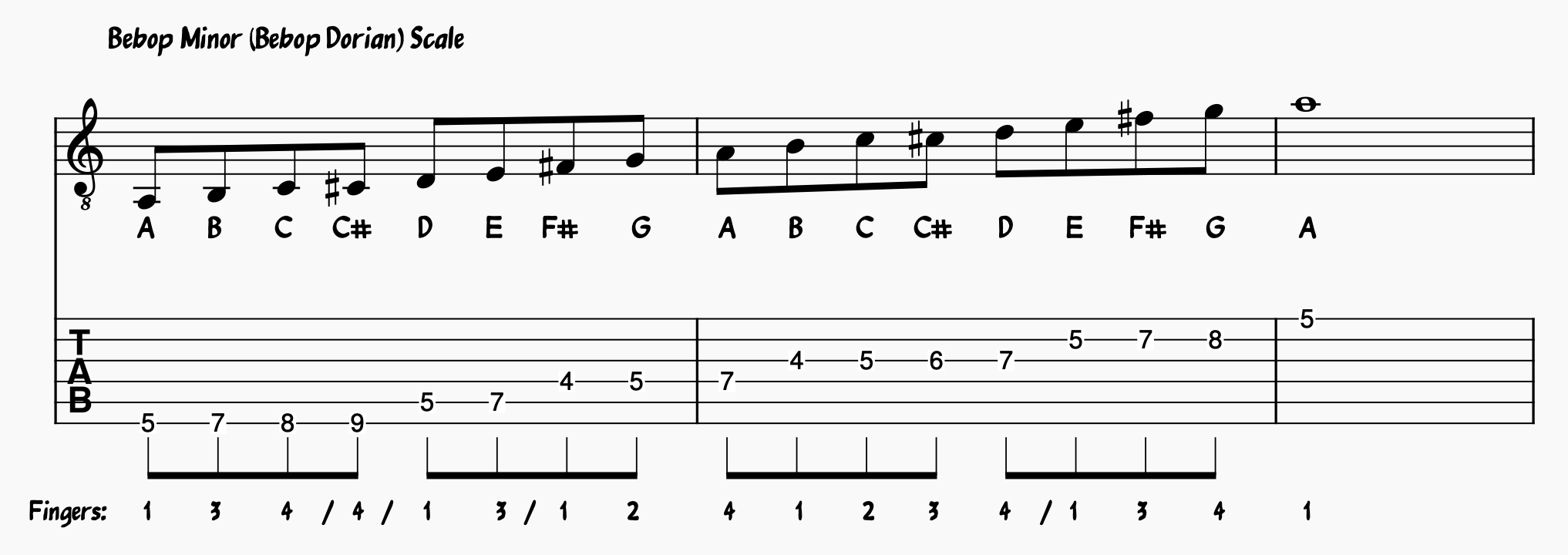
15. Bebop Dominant Scale
The Bebop dominant scale has a passing tone between the minor 7th scale degree and the root:

26. Bebop Melodic Minor
The bebop melodic minor scale has a chromatic passing tone between the 5th and 6th scale degrees:
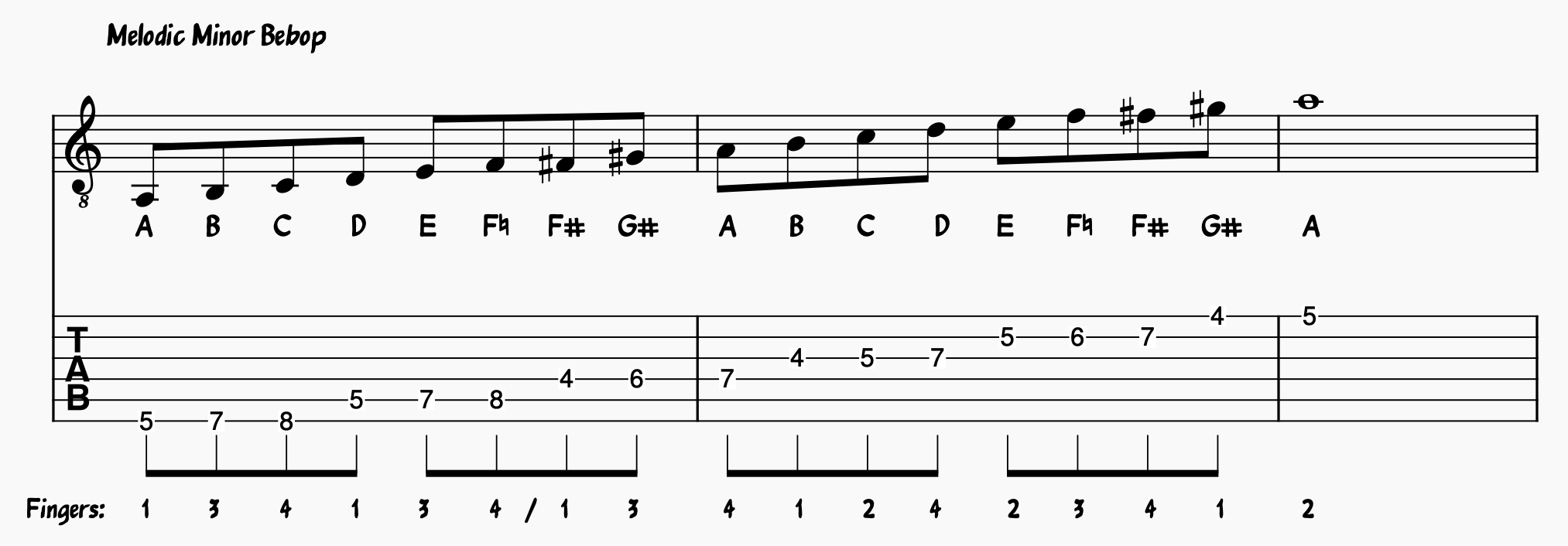
Want to learn more about bebop language on guitar? Check out our article on 10 jazz guitar licks you need to know!
Other Jazz Guitar Scales
Let’s cover some other useful jazz scales you need to learn to master jazz guitar!
17. Whole-Tone Scale
The whole tone scale is comprised of whole steps! It is a hexatonic scale, meaning it has six notes. The whole tone scale works well over dominant chords with a natural 9, a #11/b5, and a #5/b13.
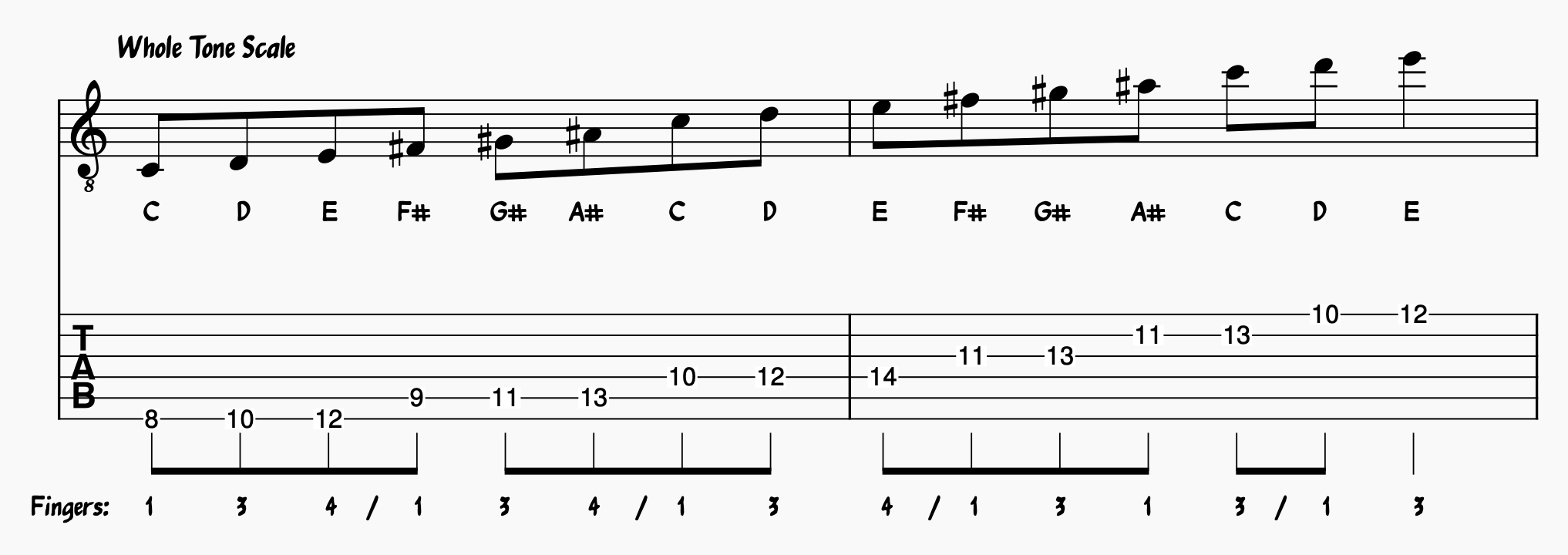
18. Minor Pentatonic Scale (And All Pentatonic Scales)
This wouldn’t be a guitar article if we didn’t cover old reliable—the minor pentatonic scale. Pentatonic scales are five-note scales that don’t have any half-steps. They have no 2nd or 6th (sometimes 7th, depending on the mode).
An A minor pentatonic scale has a Rt., a 3rd, a 4th, a 5th and a 7th:
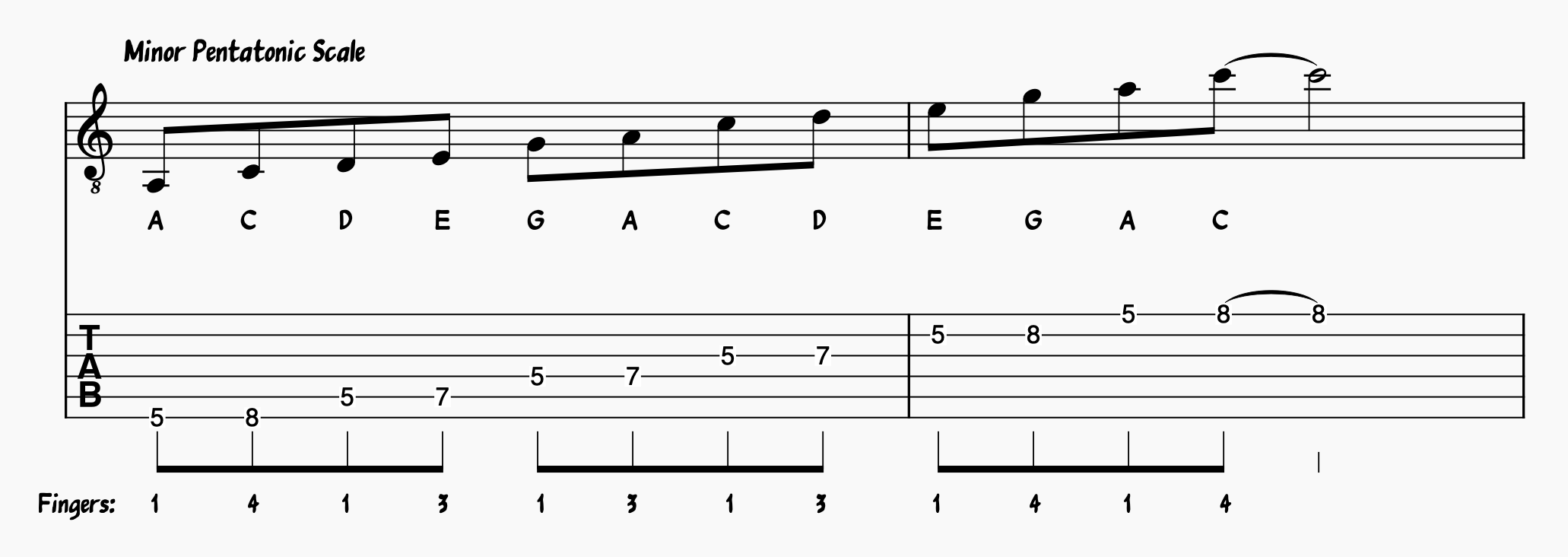
The minor pentatonic scale and other pentatonics are like “scaffold” or “skeleton” scales. They lack defining information, which makes them more ambiguous. You can play an A minor pentatonic over a ii chord, a iii chord, or a vi chord, as it’s often the 2nd and 6th that make minor scales distinct.
Because of their ambiguity, you can utilize pentatonics in creative ways. Here is a [ii-V-I] lick that uses chromatic ascending minor pentatonic scales to hit various chord tones:
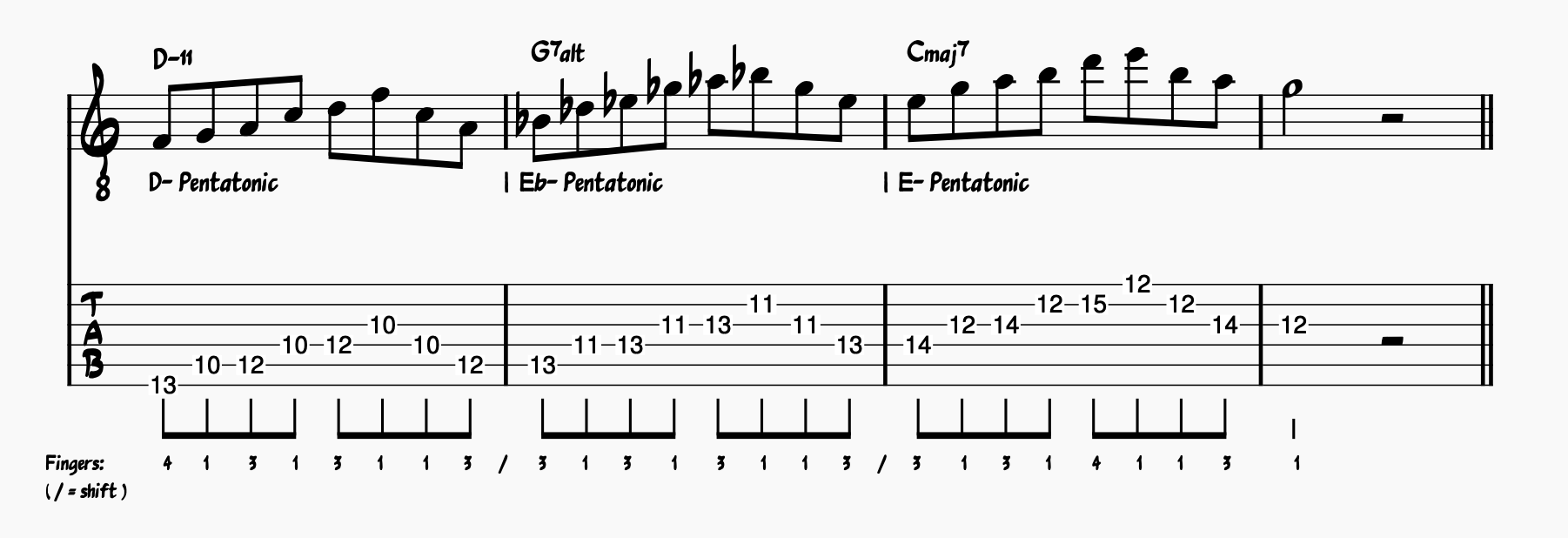
19. Blues Scales
The traditional blues scale is a minor pentatonic scale with a chromatic passing tone between the 4th and 5th scale degree. However, its applications go beyond blues music.
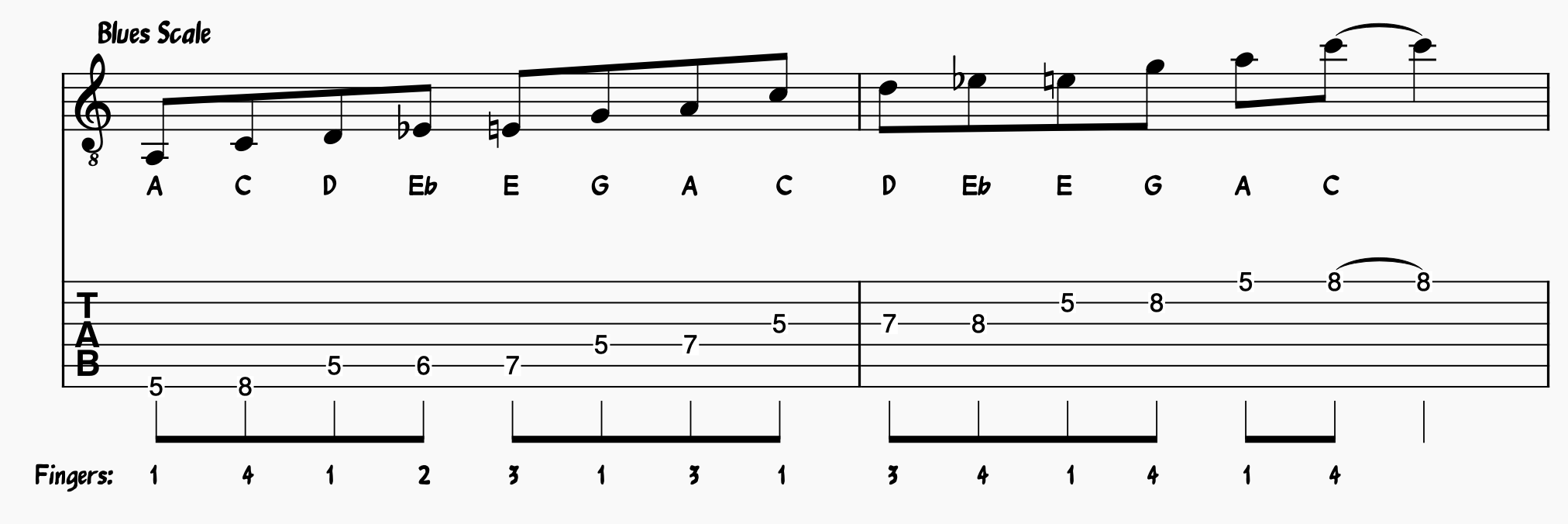
20. Harmonic Minor Scale
The harmonic minor scale is another minor scale with a unique property: a minor 6th and major 7th interval. This means a minor 3rd gap exists between the 6th and 7th scale degrees.
- Notes: A-B-C-D-E-F-G#-A
- Step Formula: W-H-W-W-H-m3*-H
- Scale Degrees: Rt., M2, m3, P4, P5, m6, M7
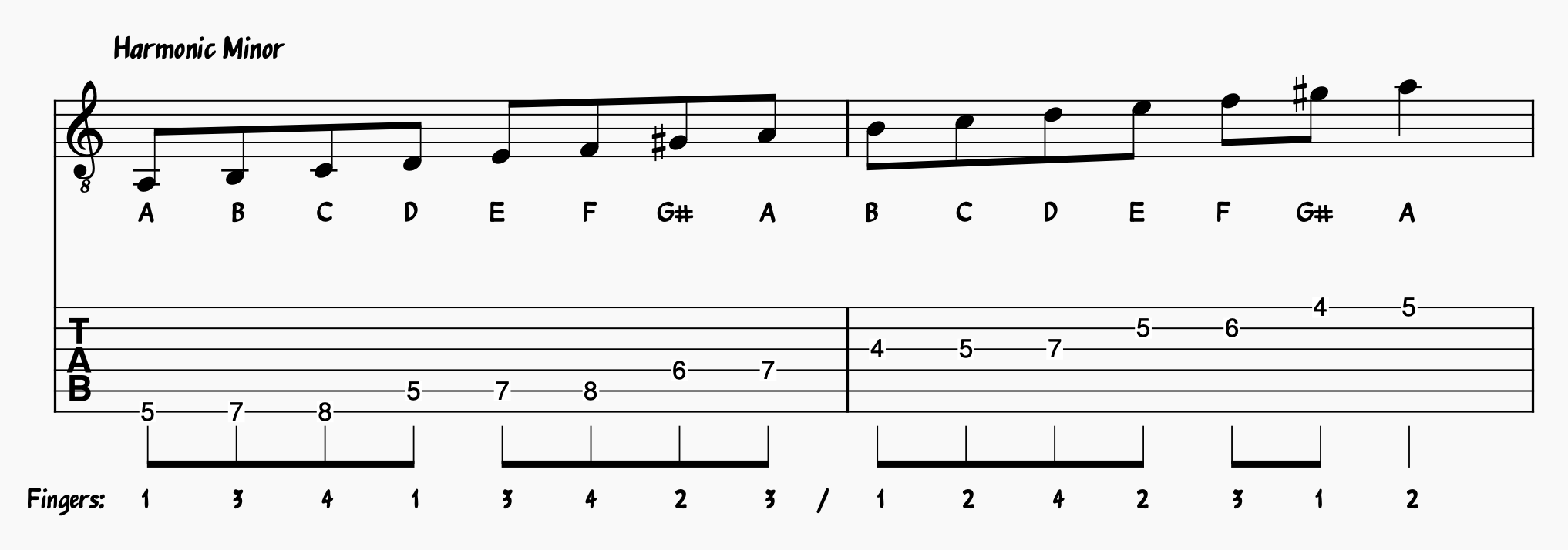
Harmonic minor has its own modes, which can also be useful for playing over jazz chords:
- Aeolian Natural 7
- Locrian ♮6
- Ionian #5
- Altered Dorian
- Phrygian Dominant
- Lydian #2
- Super-Locrian bb7
Want to learn more about the harmonic minor scale and its modes? Check out our guide.
And, if you are new to jazz guitar and feeling overwhelmed, check out our intro to jazz guitar article. It will help you focus on the essentials in the practice room and at the jam session!
Want to Supercharge Your Jazz Guitar Skills? Join the Inner Circle.
If you found this article helpful and want to take your jazz guitar skills to the next level, check out the Learn Jazz Standards Inner Circle.
The Inner Circle is designed to help you become the best jazz musician you can be. When you join, you get access to over a decade of incredible jazz education resources, including masterclasses, guitar-specific courses, and monthly jazz standard deep dives.
Plus, you’ll join a community of like-minded jazz musicians dedicated to improving their craft.
Ready to take your jazz guitar skills to the next level? Join the Inner Circle.


